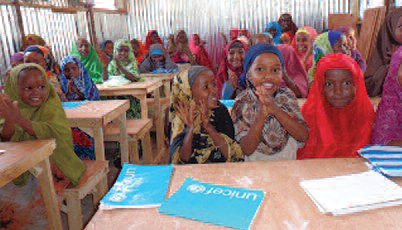School feeding: experiences from Somalia
 Abdikadir Issa Farah
Abdikadir Issa Farah
Mr. Abdikadir Issa Farah is the Programme Manager of Formal Education Network for Private Schools (FENPS). He has been working in education in emergencies for 8 years.
Somali people have been affected by the devastations of war, drought and floods for more than twenty years. Hundreds of thousands of Somali families have been displaced and an estimated half of a million Somalis have fled the country to find safer places to live. In 2011, one of the worst droughts in 60 years devastated many regions of Somalia. Combined with the existing conflict and poor food security situation, famine was officially declared in many parts of the southern region.
 In response, FENPS (Formal Education Network for Private Schools), a humanitarian organisation established in 2003, launched an education project to provide close to 5,000 school-aged children between five and 15 years in Mogadishu, the capital of Somalia, with free-of-charge quality education and nutrition through a school feeding project. The project aimed to ensure the fundamental right of people in crises to quality and relevant education, with special attention given to the safety and wellbeing of the children.
In response, FENPS (Formal Education Network for Private Schools), a humanitarian organisation established in 2003, launched an education project to provide close to 5,000 school-aged children between five and 15 years in Mogadishu, the capital of Somalia, with free-of-charge quality education and nutrition through a school feeding project. The project aimed to ensure the fundamental right of people in crises to quality and relevant education, with special attention given to the safety and wellbeing of the children.
The project was implemented from 1st January to 31st December 2013 and cost USD332,880. Funds were provided by various international donors through the Common Humanitarian Fund (CHF). Project expenditure covered teachers’ incentives, school construction, cost for clean drinking water, food, hygiene and sanitation supplies, costs for training workshops for teachers and community education committees (CECs).
Through the project, children were given nutrition lessons where they were taught good eating habits and healthy practices. These lessons were integrated into the school curricula. After the nutrition lessons, the children were provided with a nutritious meal that consisted of fruit soup (different fruits mixed and cooked together with water and some oil), cooked rice, milk for drinking, a banana and sometimes a cooked egg and/or meat, mango juice or porridge. In addition to the meal, children were provided with a ration of supplementary food to take home. FENPS followed WFP’s Food Basket guidelines to design the rations. FENPS bought foods for this programme from the local meals in the markets.
As part of the project, FENPS installed school sanitation facilities, provided safe drinking water and water for personal hygiene and trained volunteers from the community in how to maintain and service the facilities. Parents of the children were invited to workshops on nutrition so that they too could better understand the importance of nutrition for all household members.
FENPS internal evaluations and an external mid-term review of the project1 highlighted several positive outcomes, specifically:
- Increased children’s attendance (observed by FENPS staff)
- Positive impact and attractive environment for both children and teachers (based on interviews with parents and teachers)
- Increased motivation in other school activities (reported by teachers and other education personnel).
Challenges
A key problem encountered in the project was low enrollment amongst girls as compared to boys. This is a common obstacle in Somalia along with keeping girls in school. There are a number of negative socio-cultural practices that hinder girls’ enrollment in schools in Somalia including:
- Female genital mutilation (FGM) which places girls in a position to be married
- A general gender bias which typically favours boys over girls
- Child labour which disproportionately affects girls who are required to supplement the family income
- Poor public awareness on the importance of girl’s education.
To address some of these constraints and improve girl’s enrollment, FENPS provoked debates on issues that were detrimental and those that were beneficial for girls. Additionally, awareness-raising lessons were provided for parents about child marriage and FGMto overcome these challenges. Parents were encouraged to seek alternative ways of socialising girls where FGM is practiced (i.e. psychosocial support, life skills and mentoring).
Alternatives suggested:
- Educating and having dialogue in homes and schools
- Engaging group discussions among parents on issues affecting their children
- Encouraging dialogue between parents and children through schools
- Promoting participation of children in forums concerning the protection of child rights
- Sensitising parents about the importance of girls education.
More girls (51%) enrolled in FENPS supported schools in the second term.
Looking ahead, FENPS recommends integrating nutrition programmes into education response in emergencies. Although this project has finished, the need for improved education remains and FENPS is committed to supporting improved education throughout Somalia.
1Conducted by Africa Primus Inc.

